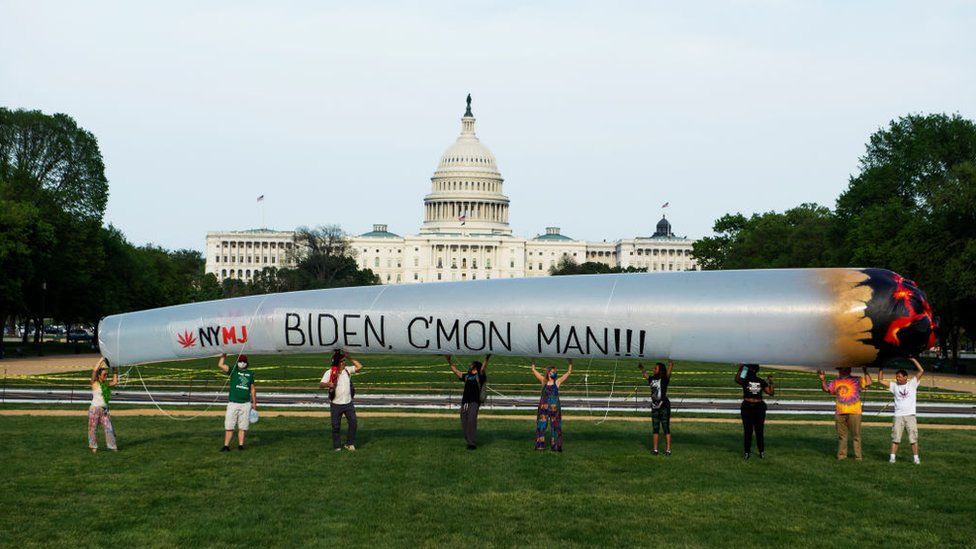ARTICLE AD BOX
 Image source, Getty Images
Image source, Getty Images
Cannabis justice advocates in front of the US Capitol last year
US cannabis policy has been thrust to the fore after President Joe Biden issued a blanket pardon for Americans federally convicted of possessing small amounts of the drug.
Mr Biden also urged governors to do likewise on state offences and called for a review on whether cannabis should be listed as a less serious drug.
Federal law currently classifies cannabis as a Schedule I controlled substance, meaning it has "no currently accepted medical use and a high potential for abuse".
As one White House official noted, that's "the same schedule as for heroin and LSD, and it's even higher than the classification for fentanyl and methamphetamine - the drugs that are driving [America's] overdose epidemic".
"It makes no sense," Mr Biden said on Thursday, as he directed his attorney general and health secretary to oversee a review.
"Too many lives have been upended because of our failed approach to marijuana. It's time that we right these wrongs."
The news came as a surprise to many, but it has set cannabis stocks ablaze. Advocates say the move is a first - albeit overdue - step to bringing a $33bn (£30bn) industry out of the shadows and providing relief to those impacted by a "war on drugs" that began in the 1970s.
"It's a welcome conversation starter," said Kassandra Frederique, executive director of the Drug Policy Alliance non-profit.
"We've been waiting for some action around cannabis reform federally, so we welcome the opportunity to use it for a much broader conversation about reform."
As the White House itself has noted, Mr Biden's pardons - for "simple possession" - are limited in scope. Only about 6,500 people with federal convictions and some District of Columbia (DC) residents are eligible for the relief.
That's because, while nearly 29 million Americans have been arrested for cannabis-related violations since 1965, nobody is currently in federal prison solely for possession. In addition, most convictions for possession are at the state and local level, and presidential pardons only apply to federal charges.
Image source, Getty Images
Image caption,Cannabis is legal for recreational use in 19 states, and for medicinal use in 37 states and the District of Columbia
Ms Frederique argues, however, that the president's actions have "put teeth behind" efforts to relieve the perceived harms of cannabis prohibition.
Organisations like hers are calling on the president to de-schedule the drug - that is, repeal cannabis from the US Controlled Substances Act of 1970 and regulate it in the same way as alcohol or tobacco.
"Without de-scheduling, people are going to keep facing criminal charges and be denied federal benefits; marijuana research will continue to face hindrances; veterans won't be able to access medical cannabis programmes; federal employees can still be fired for using cannabis; entrepreneurs and businesses will not have access to funding; and, banks will continue to be hesitant to offer loans," Ms Frederique said.
If the Biden-initiated review does ultimately call for re-classifying cannabis, the federal government will be catching up to reforms already underway in several US states.
Currently, 37 states and DC have legalised medical cannabis, while 19 states have approved the drug for recreational use. That represents well over 40% of the US population.
Voters in five more states - Arkansas, Maryland, Missouri, North Dakota and South Dakota - will cast ballots next month on whether to allow recreational cannabis use, with at least four more ballot referendums expected in 2023 and 2024.
It is a reflection of how much the politics of cannabis reform have changed over a short period of time. A Gallup poll last year showed that a record 68% of Americans are now in favour of legalising the drug.
And, while Democrats and independents are far more likely to support loosening restrictions on cannabis use, about half of Republicans are also on board, the poll shows.
Reacting to Mr Biden's announcement on Thursday, Republican congresswoman Nancy Mace of South Carolina gave "credit where credit is due".
"I don't always agree with the Biden administration, I've been very vocal about that, but this is a step in the right direction," Ms Mace told the Fox Business Network.
Cannabis boom: Why Oklahoma is a 'wild Wild West'
In fact, Mr Biden's actions represent an about-face on his own track record as a lawmaker. He claims to have never touched cannabis and, over a 35-year tenure in the US Senate, authored and voted in favour of many tough-on-drug laws.
Industry experts expect that broad praise for his Thursday announcement will benefit the president and his party in midterm elections next month that threaten Democrats' control of Washington.
"Moving to repeal the federal prohibition of marijuana isn't just good policy. It's good politics," Paul Armentano, deputy director of the National Organisation for the Reform of Marijuana Laws (NORML) advocacy group, told the BBC.
He argued that, by engaging with the matter from his bully pulpit, the president is "taking an issue that has been seen politically as a fringe issue, and has legitimised it".
But it is only Congress - not the president - who can unilaterally act to amend or repeal cannabis prohibition.
Bills to de-schedule cannabis and to ease the financial burdens on cannabis retailers have passed this year in the US House of Representatives - but none of these efforts have advanced in the upper chamber of Congress. That is in spite of vocal backing for certain measures by Senate Majority Leader Chuck Schumer, who holds the power to bring bills to the floor but has been unable to garner enough support.
"By having the most powerful elected politician in this country talking about marijuana policy and taking steps to impact marijuana policy, that has elevated this debate," said Mr Armentano.
"He has squarely put the pressure back on Congress, where it belongs, and said: it's up to you to finish the job."

 2 years ago
19
2 years ago
19








 English (US)
English (US)